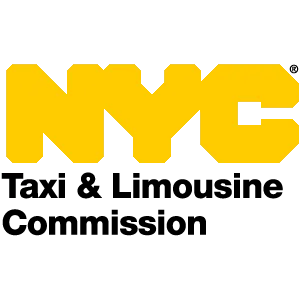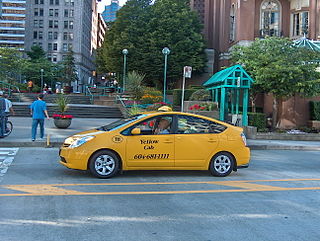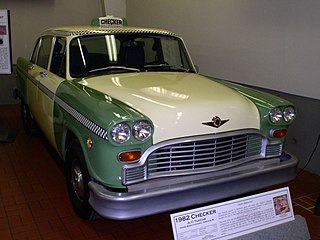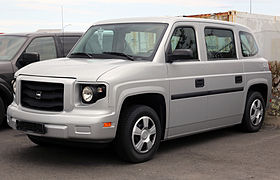
Mishawaka is a city on the St. Joseph River, in Penn Township, St. Joseph County, in the U.S. state of Indiana. The population was 51,063 as of the 2020 census. Its nickname is "the Princess City" or simply "The Waka". Mishawaka is a principal city of the South Bend-Mishawaka, Indiana — Michigan, Metropolitan Statistical Area.

AM General is an American heavy vehicle and contract automotive manufacturer based in South Bend, Indiana. It is best known for the civilian Hummer and the military Humvee that are assembled in Mishawaka, Indiana. From 1974–1979 the company also manufactured transit buses, making more than 5,400 of them.

A hackney or hackney carriage is a carriage or car for hire. A hackney of a more expensive or high class was called a remise. A symbol of London and Britain, the black taxi is a common sight on the streets of London. The hackney carriages carry a roof sign TAXI that can be illuminated to indicate their availability for passengers.

An auto rickshaw is a motorized version of the pulled rickshaw or cycle rickshaw. Most have three wheels and do not tilt. They are known by many terms in various countries, including 3wheel, Adaidaita Sahu, Keke-napep, Maruwa, auto rickshaw, auto, baby taxi, bajaj, bao-bao, chand gari, easy bike, jonnybee, lapa, lapa-lapa, mototaxi, pigeon, pragya, tuktuk, tukxi, and tum-tum.

The Chevrolet Equinox is a crossover SUV introduced by Chevrolet in 2004 for the 2005 model year. It was intended to replace the North American Chevrolet Tracker and Chevrolet S-10 Blazer. The third-generation Equinox also replaced the first-generation Chevrolet Captiva.

Checker Motors Corporation was a vehicle manufacturer, and later an automotive subcontractor, based in Kalamazoo, Michigan. The company was established by Morris Markin in 1922, created by a merger of the firms Commonwealth Motors and Markin Automobile Body, and was initially named the Checker Cab Manufacturing Company. The manufacturer was originally based in Chicago, before moving to Kalamazoo in 1923. The company was renamed Checker Motors in 1958.

The Ford Transit Connect is a compact panel van sold by Ford since 2002. Developed by Ford of Europe, the model line replaced sedan-based vans with a dedicated commercial vehicle platform. The model line is the second-smallest vehicle of the Ford Transit range, slotted between the Ford Transit Courier LAV and the Ford Transit Custom LCV/MPV. In line with other Ford Transit variants, passenger-oriented models are marketed as the Ford Tourneo Connect with side windows and rear seats.

In New York City, taxicabs come in two varieties: yellow and green; they are widely recognizable symbols of the city. Taxis painted yellow are able to pick up passengers anywhere in the five boroughs. Those painted apple green, which began to appear in August 2013, are allowed to pick up passengers in Upper Manhattan, the Bronx, Brooklyn, Queens, and Staten Island. Both types have the same fare structure. Taxicabs are operated by private companies and licensed by the New York City Taxi and Limousine Commission (TLC). It also oversees over 40,000 other for-hire vehicles, including "black cars", commuter vans, and ambulettes.
The taxicabs of the United States make up a mature system; most U.S. cities have a licensing scheme which restricts the number of taxicabs allowed. As of 2012 the total number of taxi cab drivers in the United States is 233,900; the average annual salary of a taxi cab driver is $22,820 and the expected percent job increase over the next 10 years is 16%.

The MCW Metrocab is a taxicab that was manufactured between 1987 and 2000 and as the Metrocab TTT from 2000 to 2006. It was designed and originally produced by the British vehicle manufacturing company Metro Cammell Weymann (MCW), with ownership passing to Reliant in 1989, Hooper in 1991 and finally Kamkorp in 2000.

The Metropolitan Conditions of Fitness for Taxis set out the requirements for vehicles that may be used as licensed Hackney carriage taxi cabs in London. They are what makes London's taxis unique in the world and are governed by Transport for London's Taxi and Private Hire office.

The New York City Taxi and Limousine Commission is an agency of the New York City government that licenses and regulates the medallion taxis and for-hire vehicle industries, including app-based companies such as Uber and Lyft. The TLC's regulatory landscape includes medallion (yellow) taxicabs, green or Boro taxicabs, black cars, community-based livery cars, commuter vans, paratransit vehicles (ambulettes), and some luxury limousines.

In Malaysia, taxicabs are also referred to as teksi. There are several taxi operators running within Malaysia. Most taxicabs use their preferred car of choice, the Proton Saga Iswara saloon since the 1990s, and a distinct fleet of cabs are the newer generation of Proton Saga since the 2010s.

A taxi, also known as a taxicab or simply a cab, is a type of vehicle for hire with a driver, used by a single passenger or small group of passengers, often for a non-shared ride. A taxicab conveys passengers between locations of their choice. This differs from public transport where the pick-up and drop-off locations are decided by the service provider, not by the customers, although demand responsive transport and share taxis provide a hybrid bus/taxi mode.

Cars such as Toyota Etios, Maruti Omni, Mahindra Logan, Maruti Suzuki, Tata Indica and Tata Indigo are fairly popular among taxicab operators. The livery of the taxicabs in India varies from state to state. In Delhi and Maharashtra, most taxicabs have yellow-black livery, while in West Bengal, taxis have yellow livery. Private taxicab operators are not required to have a specific livery. However, they are required by law to be registered as commercial vehicles.

Hybrid taxi or hybrid electric taxi is a taxicab service provided with a hybrid electric car (HEV), which combines a conventional internal combustion engine propulsion system with an electric propulsion system.

Checker Taxi was a dominant taxicab company and national franchisor that was based in Chicago, Illinois. Checker Motors was an American vehicle manufacturer based in Kalamazoo, Michigan that built the iconic Checker Taxicab, sold commercially as the Checker Marathon until 1982. Both companies were owned by Morris Markin by the 1930s.

Boro taxis are taxicabs in New York City that are allowed to pick up passengers in outer boroughs and in Manhattan above East 96th and West 110th Streets. The color of boro taxis is apple green in contrast to the traditional yellow taxis in New York City.

The Toyota JPN Taxi, sometimes known as the Toyota Japan Taxi, is a hybrid electric taxicab built to universal design specifications mandated by the Japanese government. Exhibited as the JPN Taxi Concept at the 43rd Tokyo Motor Show in 2013, it has been produced by Toyota since 2017, mainly for the Japanese and Hong Kong markets.

London EV Company Limited (LEVC), formerly The London Taxi Corporation Limited, is a British automotive manufacturer with its headquarters at Ansty Park near Coventry, England. It is a wholly-owned subsidiary of Chinese automaker Geely. The company produces London’s famous black taxicabs.























